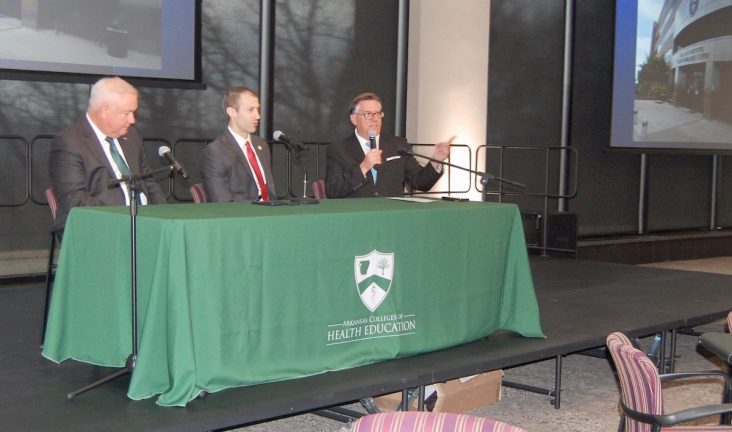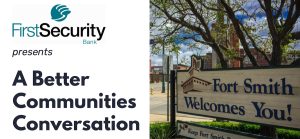‘We need unity’ noted during discussion at Fort Smith Better Communities event
by March 8, 2022 5:00 pm 1,192 views

(from left) Better Communities panelists Col. Rob Ator, USAF (Ret.), Arkansas Economic Development Commission director of Military Affairs, Arkansas Secretary of Commerce Mike Preston, and panel moderator Roby Brock with Talk Business & Politics.
Consensus among panel speakers at the Better Communities town hall Tuesday (March 8) was that Fort Smith is a good community and making it a great community includes improving cooperation and support, and welcoming diversity.
“We’ve got to get unity,” said Kyle Parker, CEO of Arkansas Colleges of Health Education and one of the event’s panelists. “We cannot have pockets of people competing against each other and being negative to other pockets of people. We need unity. We need to support each other.”
Talk Business & Politics, in partnership with First Security Bank, the Arkansas Department of Commerce and the Fort Smith Regional Chamber of Commerce hosted the “Better Communities” town hall at the ACHE Research Institute Health and Wellness Center in Fort Smith to discuss initiatives in the business and political community to help grow the Fort Smith metro region and how the state can better partner with local efforts. Also serving as panelists at the event were Judy McReynolds, ArcBest chair, president and CEO; Dr. Terisa Riley, University of Arkansas at Fort Smith chancellor; Arkansas Secretary of Commerce Mike Preston; and Col. Rob Ator, USAF (Ret.), Arkansas Economic Development Commission director of Military Affairs.
Parker said seeking better unity is also in how people in the area welcome diversity.
“We have a unique opportunity to capitalize on things here because of Fort Chaffee being a relocation center. Because of that, we’ve got Vietnamese, Haitians, Cubans, Maltese coming through this area, as well as, I’m sure we’re going to get some Ukranians and Afghans. All colors, all religions. It makes Fort Smith a very diverse city in a very small size. And the key is for the community to adopt and to love people regardless whether you’ve got a burka on or your skin color is different or your male, female, sexual orientation is different. That’s how cities grow because people today choose where they want to live and then seek the employment and that is the real key to me,” Parker said.
WORKFORCE INNOVATION
While panelists all offered suggestions about what makes Fort Smith and the region attractive to business and residents as well as suggestions about what could make it better, all agreed what Fort Smith really needs is to be more unified and supportive and better at telling its story.

Parker said two key factors in where people choose to live are healthcare and education. Fort Smith, the panel of experts said, is doing well in those areas, he said. ACHE is working to educate future doctors through the Arkansas College of Osteopathic Medicine, is working to train healthcare professions in other areas, and it is working to create a healthy community through the Health and Wellness Center, Parker said.
As far as education goes, the innovative things Fort Smith is doing through ACHE, UAFS, Fort Smith Public School’s Peak Innovation Center and more are leading the change to make the area a better place, Ator said. McReynolds said having innovation and a growing future in those two areas helps Fort Smith compete for the resources of people in a time when more and more people are choosing the place they want to live and then searching for a job there, rather than finding a job they want and moving to wherever it is, panelists said.
Fort Smith also is doing a good job in creating new opportunities in terms of art and trail systems that contribute to the quality of place, Riley said. There are also many jobs open in the area, Reynolds said, noting that ArcBest has 300 job openings in the area.
ART AND EDUCATION
Panelists also offered what Fort Smith needed to be a better community. Riley said Fort Smith needs increased access to transportation, including bike routes and better public transit. Parker said there needs to be more work in making sure children receive the nutrition and nutritional education they need. He discussed how ACHE is working toward that with a pilot program collaboration with FSPS and Brightwater, a Center for Food Science, but said there is room for more work in that area.
“We have got to have a healthy, vibrant city with healthy people in it, walking these trails, viewing this art, truly, truly truly making transformational change,” Parker said.
Reynolds and Riley also agreed that more people need to be seeking education after high school, whether that be through certificates, associate degrees, bachelor’s degrees or post-bachelor work.
“Only 44% of high school graduates in the state are pursuing post secondary education. We have a number of pathways. We need to spread the word on that,” Riley said.
There are a number of job openings at ArcBest and other businesses in the city that need applicants with the skills, certificates and degrees that come from that education, Reynolds said.
Fort Smith also needs more housing, Preston said.
“There has been a tremendous amount of success in economic development in Fort Smith… Fort Smith is its own identity. It’s on the map and people want to be here,” Preston said. “The next challenge we look at in Fort Smith will be with housing. The projects we have coming in, the military, there is going to be a lot of housing that needs to take place. … To me in Fort Smith, that is going to be the next big hurdle to face.”
